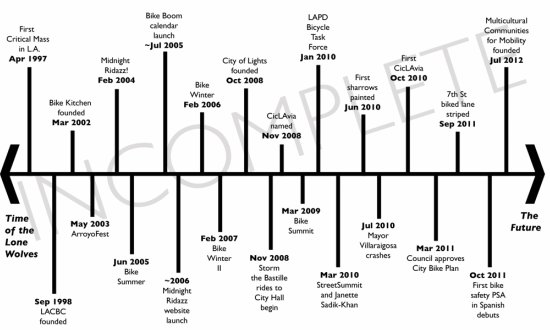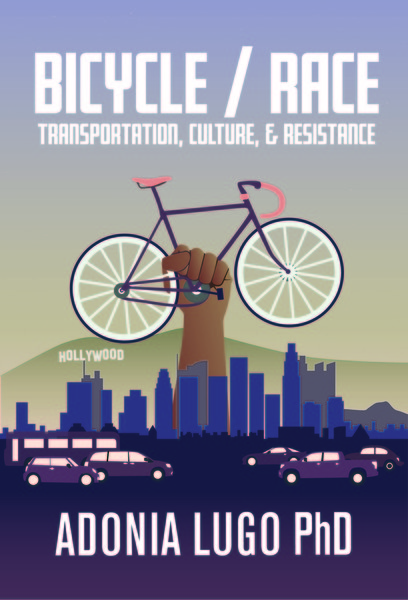How does an ethnographer check in with a social movement? I spent two
and a half years absorbing the zeitgeist of Los Angeles bike activism
by participating in it. Then I spent two years thinking and writing
about those experiences. After so much time away from a rapidly changing field site, I've started to wonder how closely the
timeline of bike movement history that I developed aligns with the
narratives of other activists.
On Friday night, Ron Milam and I are co-hosting an attempt at a group ethnography called "Building a Bike Movement in Autopia" (7-9 pm at the L.A. Ecovillage). I wonder how the people who have created a vibrant bike
counterculture in Los Angeles think of their relationship to the
city. Can we, as a group, trace the outlines of the bike movement,
which on its own cannot speak and exists only through the
collaborative actions of multiple individuals? I've learned that
media coverage of community-based movements often leaves out the
complicated webs of human infrastructure that bring subcultural
interests into mainstream reality. People in the street, advocates
taking their concerns to political offices, people who work behind
the scenes in public offices, and elected officials combine in social
networks that affect policy outcomes. This gets glossed over as
"political will" rather than an ongoing process of
transforming popular opinion and policy through visible shifts in how people use space. What do bike activists in L.A. think propelled the
movement forward, and how do they connect that growth with the gains
in bicycle policy seen in LA today?
The L.A. bike movement experiment on Friday is an extension of the
"para-site" concept developed at the Center for Ethnography
at UC Irvine. It is calling upon people who experience/d the changing
state of bikes in L.A. to reflect on their agency. To my mind a
group ethnography extends the participant-observer role to others in
the field, asking interlocutors to become what Douglas Holmes and George Marcus have called "para-ethnographers." When
we're interacting with people as anthropologists, we're hardly the
only ones aware that there is a larger system that give everyday actions
meaning. I want to know what others find significant.
However,
ethnographers also agonize over making representations of what they find in fieldwork, and I don't think creating a collaborative representation of something with multiple participants
like a movement can be anything but tricky business. Activism in a city as
massive and varied as Los Angeles has many layers and milieux.
Who might be left out? For example, choosing the ecovillage as the
location for the event reflects my own embeddedness in the field; I
was an ecovillager during my fieldwork, and it's still my home when I
come to L.A. Because the ecovillage has loomed large in bike
activism, though, it may cast a shadow on the work of others, as a westside
advocate who has accomplished a lot for biking in L.A. pointed out to me.
There's no way
Friday's event can encompass the sheer volume of people and projects
that make biking in L.A. such an exciting world. But maybe with a
group ethnography, incompleteness can be seen for what it is: a starting point rather than
a part masquerading as a whole. My goal for Friday is to create a timeline of important
events and moments in L.A. bike movement history, combining many
individual perspectives into one partial narrative. There's already a
tremendous amount of information about various bike groups online
(the Midnight Ridazz online calendar alone is a treasure trove), but
maybe there's room for a knowledge archive on a movement-wide scale
that would gather stories from many sides of the city.
"Building a Bike Movement in Autopia" is sponsored by the Center for Ethnography and is part of the Bicicultures Roadshow, a mobile conference bringing research on bike cultures, advocacy, and community into one conversation this April.


